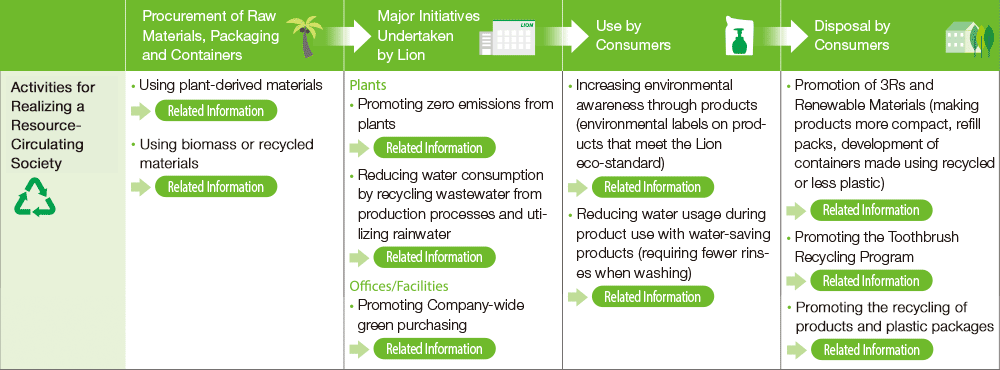The Lion Group is promoting various activities to realize a resource-circulating society by addressing issues such as plastic related problems and water resource shortages.
Plastic-related problems are related to other environmental issues as well. For example, excessive plastic use increases life cycle CO2 emissions, contributing to global warming, and improper disposal can result in marine plastics, negatively impacting biodiversity. Because Lion manufactures and sells plastic products, it has a significant responsibility regarding plastic-related problems.
The Group has published the Lion Group Plastics Environmental Declaration, which lays out its policy for addressing plastic-related problems. Based on this policy, we have set targets aimed at realizing a resource-circulating society both in Japan and abroad and are continually working to resolve these issues.
Water is a resource of utmost importance and vital for all living creatures. Concerns are rising about elevated dangers of drought and water treatment in Japan are as consequences of global warming. To address the shortage of water resources, we are working to reduce water usage throughout our product life cycles. As a corporation that provides products that are helpful in daily lives, we believe it is our responsibility to reduce water usage not only in business activities, but by offering water-saving products. Since 2010, we have been selling TOP NANOX (now NANOX one, NANOX for Washing Machines with Automatic Detergent Dispensers), a highly concentrated liquid laundry detergent that washes away easily for one-rinse, residue-free washing. In addition, as of 2020, our entire lineup of liquid laundry detergents can be used in single-rinse washing. Moreover, we introduced Acron Smart Care in February 2023, a liquid detergent that eliminates the rinse stage. We will continue to strive to reduce water usage.
* White Paper on Water Cycle FY2022 published by the Headquarters for Water Cycle Policy 〔Japanese〕
The Lion Group promotes the recycling and effective use of plastic, water and other resources at all stages from raw material procurement to disposal by consumers. We will continue to promote initiatives to realize a resource-circulating society.
Activities for Realizing a Resource-Circulating Society
